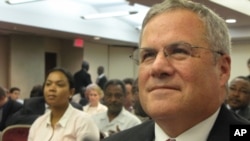President Barack Obama's special envoy to Sudan Scott Gration says he believes an oil deal is needed before a scheduled January referendum on independence for the south takes place. The vote is the central part of a peace agreement that was signed in 2005 to end the decades-long north-south Sudanese conflict.
Gration says it is crucial for the government in Khartoum and authorities in southern Sudan to come to broad terms on how to share oil resources, with most of the oil in the south, and most of the infrastructure in the north. "This is going to have to be negotiated, number one, because both sides need foreign exchange, but number two, I do not think we will have a referendum unless this issue is resolved," he said.
He said there should be in his words "a win-win" with both sides profiting from oil wealth. He spoke late Tuesday at the Center for Strategic and International Studies in Washington before dozens of dignitaries, scholars and aid workers.
Gration admitted there were many challenges for the referendum process, in particular in the oil-rich Abyei region. The flashpoint area on the border between north and south is scheduled to hold a separate vote on its future status.
Gration said there was lots to tackle for President Obama's diplomatic team in the next few months, including helping with border demarcation, as well as preparing for the possibility of a new African state.
"That is what our job is right now, to be proactive to do these things, to make sure this does not end up in a disaster because as we know in the south, we have lost millions of lives, in Darfur, hundreds of thousands, and the future, unless, we get very proactive, it could have disastrous results that pale those other numbers," he said.
Gration has also been trying to help bring peace in Sudan's Darfur region, but expressed disappointment in recent diplomatic setbacks as well as in a resurgence of violence and the difficult plight of the millions of displaced.
His update on Sudan policy came one day after the International Criminal Court in The Hague added three genocide counts to the charges against Sudan's President Omar al-Bashir for allegedly orchestrating violence this past decade in Darfur.
"The charges of genocide are additive to the indictment that President Bashir already faces and the United States supports President Bashir to be responsive to the request of the ICC and will continue to do that. As to how it affects my job, I am going to push forward to help in any way that I can," he said.
Gration said it would not have an impact on his overall goal of trying to help give current and future generations in both north and south Sudan a prosperous and peaceful life.
Mr. Bashir, who was re-elected to a new five-year term earlier this year, has refused to recognize the court's authority and says he will not turn himself in for trial. He has denied the charges, and says he is the victim of a western-led conspiracy against him and his country.
Mr. Gration heads back to Khartoum later this week for a series of multilateral meetings on a number of issues, including renewed efforts to reach a negotiated peace for Darfur and progress on the many lingering north-south issues.
US Envoy to Sudan Calls for Oil Deal Before Referendum




